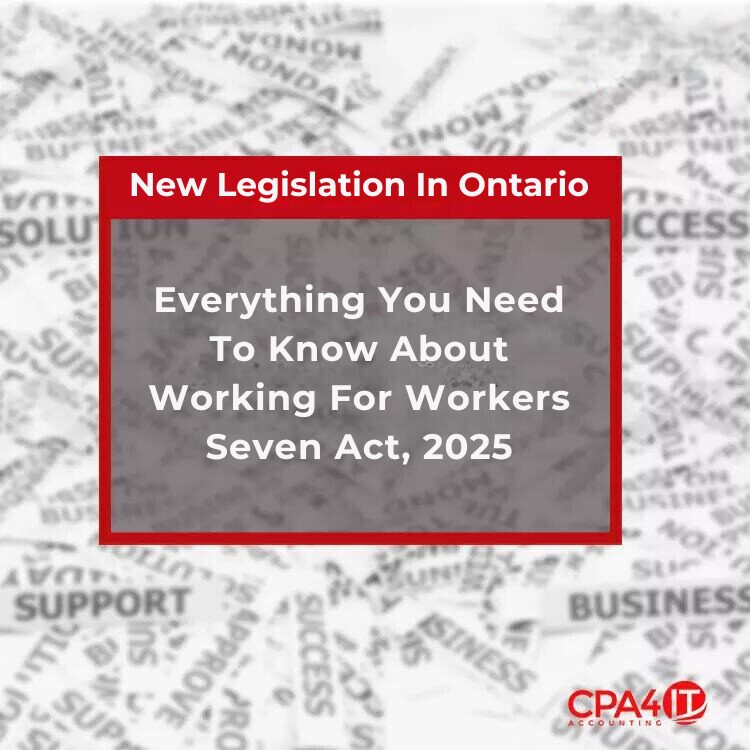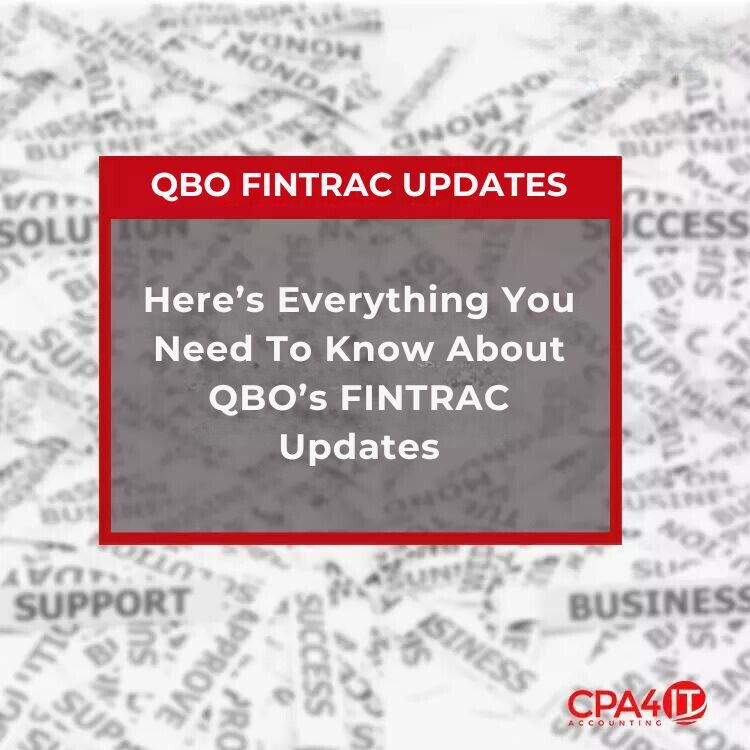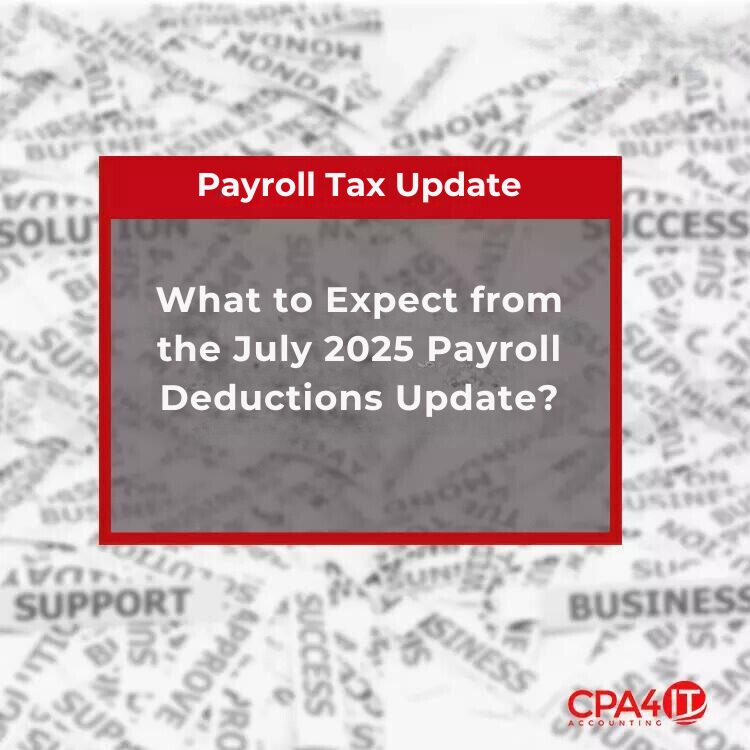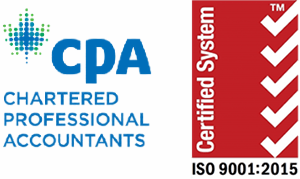If you’re a business owner contemplating the best way to remunerate yourself or seeking to optimize your tax strategy – understanding the differences between salary and dividends is crucial. We have compiled a blog which highlights the Pros and Cons of paying yourself through a Salary vs. Dividends.
How We Can Help?
Our mission at CPA4IT is to help clients organize their finances, create wealth, and transform that wealth into a lasting legacy. Tax planning is a fundamental component of this mission, which is why we constantly host webinars to explore different tax strategies to help you retain more of your hard earned income. Our goal is to debunk common myths and offer strategies that can be leveraged for effective individual tax planning. Click here to book a FREE consultation with our tax experts to learn how we can help you reduce your tax bill and increase your profits.
Understanding Salary vs. Dividends
Salary is a payment made by an employer to an employee, typically expressed as an annual amount but paid at regular intervals such as weekly, monthly, or quarterly. Salaries are subject to payroll taxes, including income tax, Canada Pension Plan (CPP) contributions, and, in some cases, Employment Insurance (EI).
On the other hand, dividends are distributions of a corporation’s profits to its shareholders. Dividends come from after-tax earnings and do not count as a corporate expense, allowing for a dividend tax credit that lowers the personal tax payable on dividend income.
Factors to Consider When Choosing Salary or Dividends
When evaluating whether to choose a dividends or a salary, several key factors should be considered:
- Income Level: Assess your personal income from the corporation and other sources.
- Cash Flow Needs: Understand your individual cash flow requirements and business expenses.
- Corporate Income: Review the predicted and past income of the corporation.
- Age and Long-Term Goals: Consider your age and long-term financial objectives.
- CPP Contributions and RRSP Contributions: Determine the importance of CPP and RRSP for your retirement planning.
These factors help in determining which strategy may be more beneficial in different situations, such as during income-earning years versus retirement.
Pros and Cons of Salary
Pros:
- Increases RRSP Contribution Room: You gain 18% of your salary in eligible RRSP room.
- CPP Contributions: Both employer and employee portions of CPP are paid, acting as a forced savings mechanism towards retirement.
- Tax Deductions: Salaries and bonuses are tax-deductible for the corporation, reducing corporate taxes.
- Income Splitting: Possibility to pay family members a salary, allowing for income splitting.
Cons:
- Payroll Remittances: Requires monthly or annual payroll remittances to the CRA.
- Immediate Tax Payment: Taxes on salary must be paid sooner compared to dividends.
- No Dividend Tax Credit: Salaries are taxed at 100% personally without the benefit of a dividend tax credit.
Pros and Cons of Dividends
Pros:
- Dividend Tax Credit: Eligible for a tax credit that reduces personal taxes on dividend income.
- No CPP Contributions: Dividends are not subject to CPP, improving cash flow.
- Flexible Payment Timing: Taxes on dividends are paid when filing your tax return, providing better cash flow management.
- No Reasonableness Test: Unlike salaries, dividends are not subject to a reasonableness test, allowing for flexible income distribution.
Cons:
- No RRSP Contribution Room: Dividends do not increase your RRSP contribution room.
- No CPP Contributions: Missing out on CPP contributions can impact retirement benefits.
- Limited Income Splitting: Tax on Split Income (TOSI) rules make income splitting with dividends less efficient, especially with family members under 65.
- Corporate Tax: Dividends are paid from after-tax earnings, and the corporation cannot deduct them as expenses.
Tax Planning Strategies
The Theory of Integration ensures that there is no net tax advantage to choosing either salary or dividends when considering both corporate and personal taxes. However, specific situations may warrant a particular strategy:
- Income-Earning Years: Paying yourself a salary is generally recommended to take advantage of RRSP contributions, CPP, and corporate tax deductions.
- Retirement Years: Dividends become more favorable as they provide better cash flow management and tax efficiency during retirement.
Exceptions may include scenarios where your personal cash flow needs or corporate income levels make one strategy more advantageous than the other.
Common Questions and Answers
1. Why Pay More Tax When Paying Dividends to Family Members?
Due to the CRA’s TOSI rules, dividends paid to family members can result in higher taxes compared to salaries, especially if the family members are under 65. The additional tax on split income offsets any potential tax benefits.
2. Can You Do Both Payroll and Dividends in the Same Year?
While technically possible, it is not recommended as it can dilute the benefits of either strategy. It’s best to choose one approach unless specific circumstances necessitate a combination.
3. What Happens if You Switch from Salary to Dividends Mid-Year?
Switching strategies requires careful handling of payroll remittances and may involve declaring an annual bonus. It’s essential to consult with an accounting professional to manage the transition smoothly.
4. Can You Pay Your Kids a Salary?
Yes, you can pay your children a salary for work performed in the business. The amount must be reasonable and justifiable based on the work done to comply with CRA regulations.
5. What Are Capital Dividends?
Capital dividends are tax-free dividends paid out of the Capital Dividend Account, which typically includes tax-free portions of capital gains. They are distinct from eligible and non-eligible dividends and require specific documentation and elections.
Conclusion
Choosing between paying yourself a salary or dividends involves careful consideration of various financial and tax factors. While salary offers benefits like increased RRSP contribution room and CPP, dividends provide tax credits and better cash flow management. Understanding the nuances and consulting with financial professionals can help you optimize your tax strategy and achieve your long-term financial goals.
Still not sure? Don’t worry, we are here to help! Click here to book a FREE consultation with our experts to understand what remuneration strategy suits your business.






